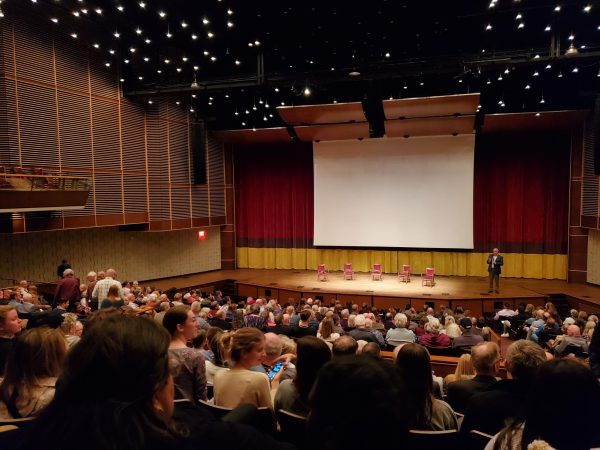Calvin departments make adjunct professors feel supported and appreciated

Calvin has 30 adjunct professors in various departments and programs.
Adjunct faculty are part of every university. The institution has 30 adjunct professors, according to the Calvin University websites of departments and programs. Adjunct professor of communication Mittie Den Herder says, “I have enjoyed working here and have felt welcomed, supported and appreciated.” Den Herder, former professor at University of Wisconsin-Platteville, accepted an adjunct position to teach oral rhetoric at Calvin in 2018.
Den Herder mentioned adjunct professors not having the same responsibilities of research and service that a tenure professor at Calvin has. Their job is primarily teaching-focused, although she mentioned having “been asked to help with a variety of activities and to provide feedback and input.” These extra commitments, however, were requested voluntarily and not required for continued employment at Calvin. Paul Moes, a professor of psychology and prior chair of the department, echoed Den Herder, saying that adjuncts are not required to attend department meetings and typically do not participate in committees or scholarship.
Den Herder elaborated on the opportunities she’s been given, saying, “I was also given many other opportunities as well — I was asked to help in the development of a health communication course, taught an advanced oral rhetoric course as well as a section of basic oral rhetoric in the spring of ’19, and have been able to participate in the Calvin Prison Initiative as an instructor. I also have been given the opportunity to teach in the Masters of Accounting program in the fall.”
Regarding the space available for adjunct professors, Den Herder compared her office space to that of adjuncts at his previous university, saying, “I was given a cubicle that I shared in theory with one of the co-chairs of the department, but since he had an office elsewhere I enjoyed the luxury of a ‘private’ cubicle. This I did not expect since this had not normally been the practice at my institution in Wisconsin — not for status reasons but lack of space.”
Rachel Venema, social work department chair, mentioned several of the improvements for adjunct professor integration that have happened: “[Adjunct professors] are now invited to new faculty orientation/training, which introduces them to Calvin and Calvin systems.” Moes mirrored Venema, stating that there have been improvements in the adjunct hiring process, such as creating a single contact that handles all the technical things adjuncts need and the adjunct professor orientation to Calvin resources. Den Herder mentioned the benefit of new faculty orientation and the assistance she received from professors in the department including sharing of materials. Venema, however, noted that, in her experience, they are not very well integrated into the university once they begin teaching. “Some of this is natural and to be expected since they may be working full-time jobs,” Venema explained.
Venema noted that the social work department tries to integrate adjunct professors into their department by inviting them to social events like coffee breaks. Moes highlighted that adjuncts are invited to social events such as birthday celebrations, presentations and gatherings, but they do not have to come to department meetings unless they want to. As a former chair, Moes would try to meet with adjuncts and visit their classes to see how things were going. But if they were only going to be around for a semester, it could prove difficult to develop relationships with them.
Moes noted that adjunct professors have year-to-year contracts. He highlighted the importance of having regular adjuncts because they become knowledgeable about the students and the department. The current adjunct in the psychology department, James DeBoe, has been an adjunct at Calvin for years and has taught two or three courses per year. It is important to have consistency with adjunct professors, as Moes said, “I think adjunct professors can fill a very useful role and be great teachers and great contributors, but only if they’re regular… I don’t think it’s healthy to have a large percentage. Some institutions have a large percentage of adjuncts, but they’re not as much a part of the overall flow, like know[ing] how students are learning in one course in the department and how they can relate to that in another course.”
According to Calvin’s website, there are currently three adjunct positions advertised: two positions for the 2019/2020 academic year and one for the 2020/2021 academic year. While, according to Venema, some students “appreciate the experience and insight of adjunct faculty members,” others can have negative ideas about having an adjunct professor. Adjunct professors, however, are well-qualified and go through an extensive application process.
Den Herder noted, “I was actually surprised by how seriously and thorough the process [of hiring adjunct professors] was since at my previous institution [University of Wisconsin-Platteville] we had so many adjuncts, and they were frequently hired not through an extended hiring process, but usually by a unilateral decision of a department chair.”
Moes mentioned that there is a requirement for adjunct professors to be Christian and make a statement of faith, but they do not abide by the same denomination-specific guidelines as full-time faculty. They do, however, make adjuncts familiar with Calvin’s philosophy and perspectives.
Face-to-face interviews included one with several members of the department and one with the academic dean. According to the philosophy department’s listing for an adjunct professor, “A PhD in philosophy is preferred, although applicants with a master’s degree in philosophy and experience in teaching philosophy will also be considered.”
Although adjunct professors have less responsibility than tenure professors at Calvin, Venema, Moes and Den Herder mentioned ways in which adjunct professors are incorporated into life at Calvin. Moes discussed the real attempts made to incorporate them into the department and mentioned their competitive pay in relation to other institutions. Overall, they are treated well. Venema concluded by saying, “It takes a lot of work to recruit, hire, train and monitor adjunct professors. They can be amazing, but in my experience, are not valued enough. I wish they were paid more.”







